Episodes
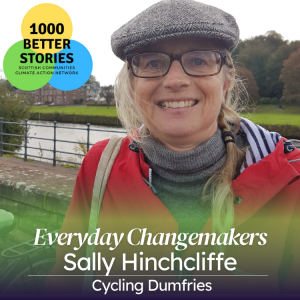
Monday Mar 04, 2024
Monday Mar 04, 2024
Our Story Weaver, Kaska Hempel, talks to Sally Hinchcliffe, a founding member of Cycling Dumfries.
The story is the first in a five-part Dumfries series of Everyday Changemakers.
Transcript
See our website: https://sccan.scot/blog/everyday-changemakers-sally-hinchcliff-cycling-dumfries/
Credits
Interview, recording and sound production: Kaska Hempel
Resources
Cycling Dumfries https://cyclingdumfries.wordpress.com/
Pedal on Parliament https://pedalonparliament.org/
UK cycling embassy https://www.cycling-embassy.org.uk/
Sustrans https://www.sustrans.org.uk/
Cycling UK https://www.cyclinguk.org/
Sally Hinchcliffe https://sallyhinchcliffe.net/
Atmospheric river event 8-9 Oct 2023 https://www.metoffice.gov.uk/binaries/content/assets/metofficegovuk/pdf/weather/learn-about/uk-past-events/interesting/2023/2023_07_scotland_rain.pdf
Storm Babet 18 - 21 October 2023 https://www.metoffice.gov.uk/binaries/content/assets/metofficegovuk/pdf/weather/learn-about/uk-past-events/interesting/2023/2023_08_storm_babet.pdf
Kirkpatrick McMillan, inventor of the pedal bike
Video story of the bike reconstruction and journey in 2023 https://youtu.be/pfvocT7rfQ4?si=50bFhanJxAstxAGN
Blog on reconstructing the bike in 2023
https://off.road.cc/content/feature/bike-check-kirkpatrick-macmillans-rear-wheel-driven-wooden-replica-13181
On Cycling Dumfries website:
https://cyclingdumfries.wordpress.com/2023/10/03/there-must-be-something-in-the-nith-water/#more-17037
BBC
https://www.bbc.co.uk/news/uk-scotland-south-scotland-19423947
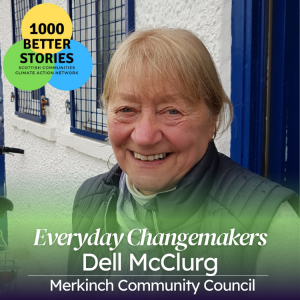
Thursday Feb 22, 2024
Thursday Feb 22, 2024
Dell McCLurg of the Merkinch Community Council reflects on turning life's challenges into local activism and the creation of the community's Merkinch Local Nature Reserve.
The story is the final in a 5-part series of weekly interviews with a variety of grassroots organisations involved in climate, biodiversity and social justice action across Inverness.
Transcript
See our website: https://sccan.scot/blog/everyday-changemakers-dell-merkinch-community-council/
Credits
Interview, edit and sound production: Kaska Hempel
Resources
Friends of Merkinch Local Nature Reserve https://www.facebook.com/merkinchreserve/
Merkinch Local Nature Reserve Ticket office http://www.merkinchlnr.org.uk/htm/old_ticket_office/old_ticket_office.php
Merkinch Community Centre https://www.merkinchcommunitycentre.co.uk/about/
Networks of community organisations:
Scottish Communities Climate Action Network https://sccan.scot/
Development Trusts Association Scotland https://dtascot.org.uk/
Highlands and Islands Climate Hub https://hiclimatehub.co.uk/
Highland Good Food Partnership (also a great podcast!) https://highlandgoodfood.scot/
Highland Community Waste Partnership https://www.keepscotlandbeautiful.org/highland-community-waste-partnership/
Circular Communities Scotland https://www.circularcommunities.scot/
Incredible Edible Network https://www.incredibleedible.org.uk/
Community Woodlands Association Scotland https://www.communitywoods.org/
Community Land Scotland https://www.communitylandscotland.org.uk/
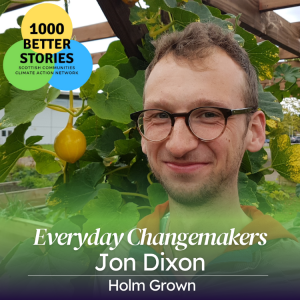
Tuesday Feb 06, 2024
Tuesday Feb 06, 2024
Jon Dixon from the new Holm Grown and Maria from Knocknagael CIC talk about shielding their green spaces from the wave of urban sprawl in Inverness.
The story is the 4th in a 5-part series of weekly interviews with a variety of grassroots organisations involved in climate, biodiversity and social justice action across Inverness.
Transcript
See our website: https://sccan.scot/blog/everyday-changemakers-jon-holm-grown-amp-maria-knocknagael-cic/
Credits
Interview recording: Kaska Hempel and Craig Dunn
Edit and sound production: Kaska Hempel
Resources
Holm Grown https://holmcommunitycouncil.org.uk/holm-grown-a-community-growing-space/
Holm Community Council
https://www.facebook.com/Holmcommunitycouncil
https://holmcommunitycouncil.org.uk/
Incredible Edible Inverness https://www.facebook.com/IncredibleEdibleInverness
Incredible Edible Network https://www.incredibleedible.org.uk/
Knocknagael Ltd https://www.knocknagael.org.uk/
Community Asset Transfers https://www.gov.scot/policies/community-empowerment/asset-transfer/
Community Land Scotland https://www.communitylandscotland.org.uk/
Highlands and Islands Climate Hub https://hiclimatehub.co.uk/
Highland Good Food Network https://highlandgoodfood.scot/
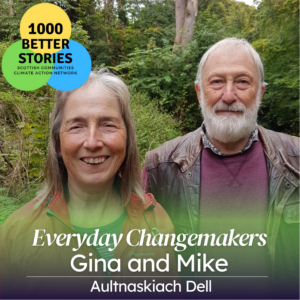
Tuesday Jan 30, 2024
Tuesday Jan 30, 2024
Our Story Weaver, Kaska Hempel, talks to Gina and Mike at Aultnaskiach Dell about the ways they have been taking care of their tiny, urban woodland.
The story is the 3rd in a 5-part series of weekly interviews with a variety of grassroots organisations involved in climate, biodiversity and social justice action across Inverness.
Transcript
See our website: https://sccan.scot/blog/everyday-changemakers-gina-and-mike-aultnaskiach-dell/
Credits
Interview, recording and sound production: Kaska Hempel
Resources
Aultnaskiach Dell website https://www.aultnaskiach.org.uk/
Community Woodlands Scotland https://www.communitywoods.org/
Case study: Aultnaskiach Dell as the Scottish Land Commission case study (includes video and report) https://www.landcommission.gov.scot/our-work/governance-ownership/community-ownership/aultnaskiach-dell-community-woodland
https://www.landcommission.gov.scot/news-events/news/municipal-forests-v-community-woodlands-reflections-from-2020-national-student-award-winner
Local press article about the early days of the Dell SCIO https://www.pressandjournal.co.uk/fp/news/inverness/673891/20000-appeal-launched-to-save-natural-habitat-in-inverness-city-centre/
Abriachan Forest Trust https://www.abriachan.org.uk
An audio story of Abriachan Forest by Mairi Mcfadyen and accompanying essay on land ownership in the Highlands http://www.mairimcfadyen.scot/fragile-correspondence/2023/audio-piece
Mairi’s presentation for SCCAN storyteller collective audio skillshare https://youtu.be/HwHo0fjlKjQ?si=szJ25FvAaQo259Xt
Case study: Abriachan Forest
https://www.forestpolicygroup.org/wp-content/uploads/2021/03/Abriachan-FPG-case-study.pdf
Community woodland case studies by Community Woodland Association, including Abriachan Forest https://cdn.forestresearch.gov.uk/2022/02/community_woodland_case_studies_scotland.pdf
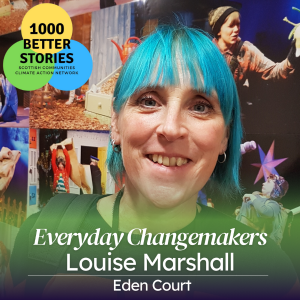
Monday Jan 22, 2024
Monday Jan 22, 2024
Our Story Weaver, Kaska Hempel, talks to Everyday Changemaker Louise Marshall, the producer for Dance and Accessible Arts at Eden Court in Inverness.
The story is the 2nd in a 5-part series of weekly interviews with a variety of grassroots organisations involved in climate, biodiversity and social justice action across Inverness.
Transcript
See our website: https://sccan.scot/blog/everyday-changemakers-louise-eden-court/
Credits
Interview, recording and sound production: Kaska Hempel
Resources
Eden Court Climate of Hope project, for COP26 https://eden-court.co.uk/news/climate-of-hope-a-beginning
Ink Asher Hemp https://eden-court.co.uk/news/back-in-my-day
Anthropocene by Gym Jam Theatre https://www.gymjamtheatre.com/home/projects
It’s Not That Radical by Mikaela Loach https://www.goodreads.com/en/book/show/61645827
Louise Marshall https://eden-court.co.uk/profile/louise-marshall
“Not in My Back Garden” performance by Eden Court’s Community Engagemnet Groups for COP28 https://www.highlifehighland.com/blog/eden-court-climate-emergency-performance-hosted-at-inverness-botanic-gardens-this-weekend/
The Eden Court’s statement of commitment to climate action https://eden-court.co.uk/news/climate-emergency-commitment?fbclid=IwAR3P5rmOgbJ_BbivDSCwSrmHnVVm7JJxfIrVIzCHFlRaJAqYVOm_1sq_j0g
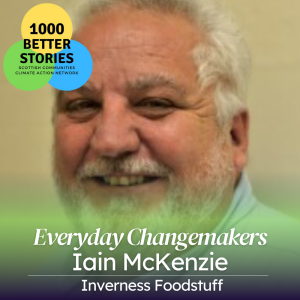
Monday Jan 15, 2024
Monday Jan 15, 2024
Our Story Weaver, Kaska Hempel, talks to Iain McKenzie, a volunteer and Vice Chair of Inverness Foodstuff.
The story is first in a 5-part series of weekly interviews with a variety of grassroots organisations involved in climate, biodiversity and social justice action across Inverness.
Transcript
See our website: https://sccan.scot/blog/everyday-changemakers-iain-mckenzie-inverness-foodstuff/
Credits
Interview, recording and sound production: Kaska Hempel
Resources
Inverness Foodstuff https://invernessfoodstuff.co.uk/
Highland Good Food Partnership https://highlandgoodfood.scot/what-do-we-do/
Highland Good Food Podcast https://highlandgoodfood.scot/podcast/
Cafe Artysans https://www.cafeartysans.org.uk/
Cafe 1668 https://www.highlandtsi.org.uk/cafe
Velocity Cafe (videos) https://www.velocitylove.co.uk/films
Active travel maps Inverness https://www.velocitylove.co.uk/active-travel-maps
Highland Community Waste Partnership https://www.keepscotlandbeautiful.org/highland-community-waste-partnership/
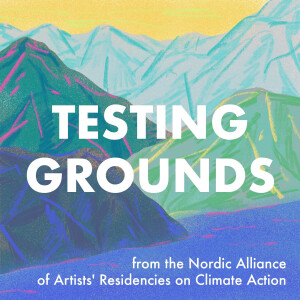
Monday Jan 08, 2024
Monday Jan 08, 2024
In this crossover episode, Katie Revell, a podcast producer and a member of SCCAN's Story Circle and the Storytellers Collective, shares a bonus episode from her Testing Ground podcast series.
It features an interview with Mairi Macleod, a Glasgow-based writer who works in both Gaelic and English, and her short story, Seasickness, or Cur na mara. Mairi’s story updates the traditional Scottish folktale, The Selkie Wife, for an age of climate crisis.
Testing Grounds series focuses on the collaborative response to the climate crisis by the Nordic Alliance of Artists Residencies on Climate Action (NAARCA). Mairi’s work was commissioned by NAARCA.
Credits
Testing Grounds is produced and edited by Katie Revell and includes original music by Loris S. Sarid and artwork by Jagoda Sadowska. The short story was commissioned by NAARCA from Gaelic writer Mairi Macleod.
Transcript
See our website:
https://sccan.scot/blog/seasickness-cur-na-mara-a-story-by-mairi-macleod-crossover/(opens in a new tab)
Resources
Testing Grounds podcast: https://testinggrounds.buzzsprout.com/2113331
NAARCA: https://naarca.art/
NAARCA blog about Mairi and her commission: https://naarca.art/2023/08/14/testing-grounds-bonus-episode-seasickness-cur-na-mara-a-short-story-by-mairi-macleod-now-available/
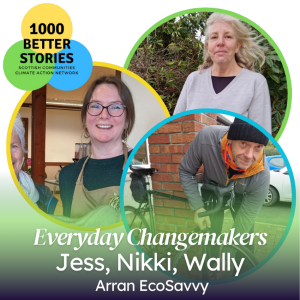
Monday Dec 18, 2023
Monday Dec 18, 2023
Our SCCAN intern, Madeleine Scobie, interviews three more people from Arran Eco Savvy. During her visit to Arran, she talked to Jess Wallace, Sustainable Food Coordinator and Nikki Harris, Eco Savvy shop manager. She also spoke with Stuart Wallace, ebike mechanic, online in October.
Transcript
See our website: https://sccan.scot/blog/everyday-changemakers-jess-nikki-stuart-arran-ecosavvy/(opens in a new tab)
Credits
Interview, recording and sound production: Madeleine Scobie.
Resources
Arran Eco Savvy website: https://arranecosavvy.org.uk/
Zero Waste Cafe: https://arranecosavvy.org.uk/about-arran-eco-savvy/current-projects/zero-waste-cafe/
Zero Waste Cafe video: https://vimeo.com/796376962/ce499f02e2
Sustainable Food Places: https://www.sustainablefoodplaces.org/
Arran Eco Savvy Community Shop: https://arranecosavvy.org.uk/community-shop/
Community Shop video: https://vimeo.com/826523465/3f3863284a?share=copy
Circular Economy: https://www.zerowastescotland.org.uk/topics/circular-economy
An illustrated interview with Wally: https://arranecosavvy.org.uk/news-events/eco-savvy-news-events/arran-eco-savvy-bike-mechanic-wally-wallace/
Active Travel Hub: https://arranecosavvy.org.uk/about-arran-eco-savvy/current-projects/active-travel-hub/
Active Travel Hub video: https://vimeo.com/799647519/663c6e3da1
20 Minute Neighbourhoods project: https://www.ourplace.scot/about-place/themes/20-minute-neighbourhoods-home/20-minute-neighbourhoods
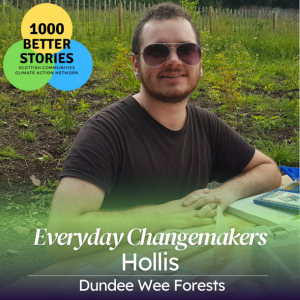
Tuesday Dec 12, 2023
Tuesday Dec 12, 2023
Our Story Weaver, Kaska Hempel, talks to Hollis, a volunteer involved in Dundee’s Wee Forest project.
The story is the final in a 5-part series of weekly interviews with members of Dundee Community Garden Network (Grow Dundee) recorded this June, and an audio tour exploring the meaning and impact of community gardening.
You can find a draft of the audio tour here:
https://izi.travel/en/ff0a-dundee-community-garden-network-draft/en
WE WANT TO HEAR FROM YOU!
We are looking for micro-story contributions about your community’s climate and social justice achievements this year so that we can include them in the next few episodes. If you or your community organisation had some proud moments, if you managed to create real glimpses of what’s truly possible or if you simply kept going against all odds please share it with our audience. You can record your message at this link (up to 90 sec): https://www.speakpipe.com/1000BetterStories.
Transcript
See our website: https://sccan.scot/blog/everyday-changemakers-hollis-dundee-wee-forests/
Credits
Interview, recording and sound production: Kaska Hempel
Resources
Wee forest project info on Nature Scot website - including a few wee videos from primary schools involved in creating them. https://www.nature.scot/climate-change/nature-based-solutions/wee-forests-part-tinyforest-global-family
Wee Forests in Dundee (University of Dundee press release) https://www.dundee.ac.uk/stories/wee-forests-make-big-impact-dundee-community
Earthwatch Europe - tiny forest project https://earthwatch.org.uk/program/tiny-forest/
Tiny Forest research and citizen science https://tinyforest.earthwatch.org.uk/tiny-forest-research
The 2023 state of the climate report: Entering uncharted territory https://academic.oup.com/bioscience/advance-article/doi/10.1093/biosci/biad080/7319571?login=false
Sugi project - Pocket Forest has a podcast on community https://www.sugiproject.com/podcast
Wee forest zine jam https://allevents.in/mobile/amp-event.php?event_id=10000528390950557
Dundee Climate/Changemakers Hub: https://creativedundee.com/2023/09/dundee-changemakers-hub/
Dundee Community Gardens Network map https://growdundee.blog/75-2/
Social Action Inquiry Scotland documentary about Dundee Community Gardens Network (Fruit Bowls, Ninewells and Maxwell) https://youtu.be/LFrZPtmgssA?si=kjQcQCG88fQfXd5d
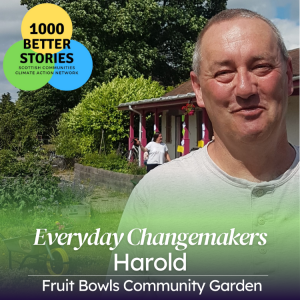
Monday Dec 04, 2023
Monday Dec 04, 2023
Our Story Weaver, Kaska Hempel, talks to Harold, one of the core volunteers running Fruit Bowls Community Garden.
The story is the fourth in a 5-part series of weekly interviews with members of Dundee Community Garden Network (Grow Dundee) recorded this June, and an audio tour exploring the meaning and impact of community gardening.
You can find a draft of the audio tour here:
https://izi.travel/en/ff0a-dundee-community-garden-network-draft/en
Tune in next week for the final story from the Fruibowls Community Garden.
WE WANT TO HEAR FROM YOU!
We are looking for micro-story contributions about your community’s climate and social justice achievements this year so that we can include them in the next few episodes. If you or your community organisation had some proud moments, if you managed to create real glimpses of what’s truly possible or if you simply kept going against all odds please share it with our audience. You can record your message at this link (up to 90 sec): https://www.speakpipe.com/1000BetterStories.
Transcript
See our website: https://sccan.scot/blog/everyday-changemakers-harold-fruit-bowls-community-garden/
Credits
Interview, recording and sound production: Kaska Hempel
Resources
Fruit Bowls Community Garden Facebook page: https://www.facebook.com/fruitbowlsdundee/
Fruibowls Garden in a blog by Repollinate: https://www.repollinate.org.uk/2022/08/10/beds-for-bees-fruit-bowls-community-garden/
Froglife https://www.froglife.org/
Repollinate https://www.repollinate.org.uk/
Bonnie Dundee IYN https://www.dundeecity.gov.uk/service-area/neighbourhood-services/environment/beautiful-scotland/bonnie-dundee
Dundee Community Garden Network/Grow Dundee https://growdundee.blog/
Scrapantics’ loose parts play https://www.scrapantics.co.uk/play
Fair Growing Green Video https://vimeo.com/778473010


